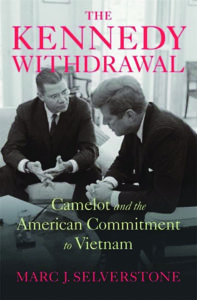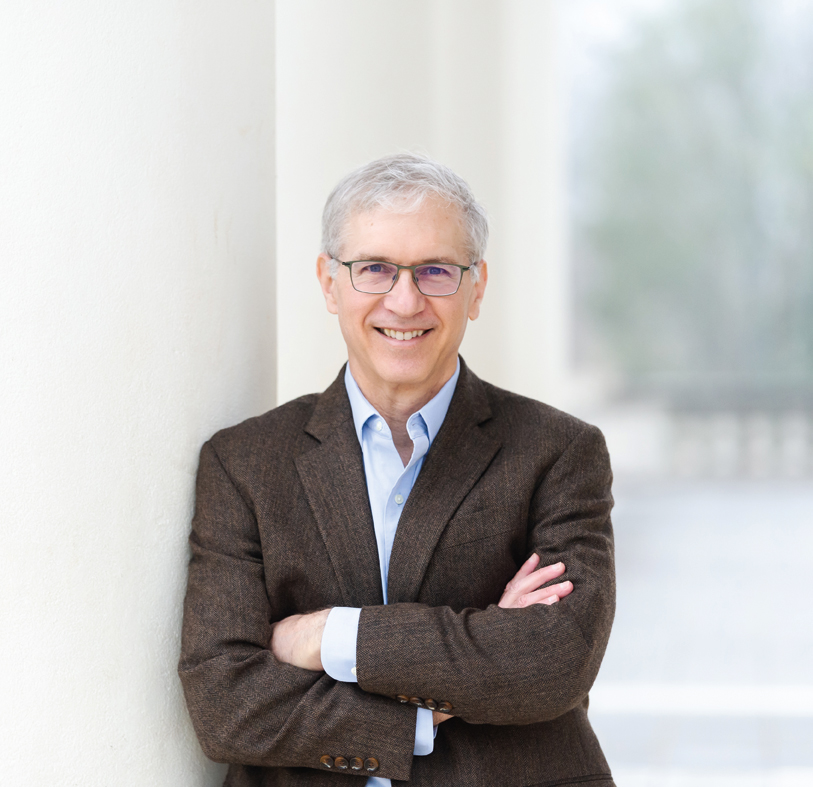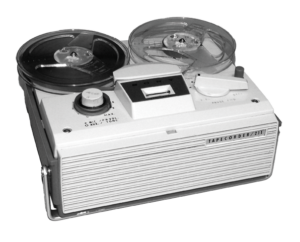In their own words
JFK expert Marc Selverstone ’84 offers insights on presidential recordings
By Andrew J. Concatelli
Marc Selverstone ’84 knows why President John F. Kennedy continues to captivate the hearts and minds of Americans, 60 years after his assassination.
“His was a life unfinished,” says Selverstone, associate professor in presidential studies and chair of the Presidential Recordings Program at the University of Virginia’s Miller Center of Public Affairs.
“Cut down at 46, seemingly with still so much promise ahead of him, and after coming through the fire of the Cuban missile crisis, Kennedy represented what for many people was the best of the United States—progressive, vibrant, with a young, attractive family,” Selverstone says. “There was a hope that we were on the cusp of great things—charting a course on the ‘New Frontier,’ entering the Space Age. Although Lyndon Johnson was able to realize and extend elements of JFK’s program, the promise and opportunity that Kennedy symbolized were cut short.”
Through his work in the Presidential Recordings Program, Selverstone preserves and studies Kennedy’s legacy using JFK’s own words. Kennedy was one in a series of sitting U.S. presidents—from Franklin D. Roosevelt to Richard M. Nixon—who recorded their phone calls and meetings. The Presidential Recordings Program makes these formerly secret White House tapes accessible to citizens, journalists, policymakers, scholars, students, and teachers while providing historical context and scholarly analysis of the recordings.

Selverstone’s new book, The Kennedy Withdrawal: Camelot and the American Commitment to Vietnam, uses these recordings, alongside declassified documents, memoirs, and oral histories, to explore the question of whether Kennedy would have gotten the United States out of the Vietnam War had he lived and pursued his own plans. “The loss of Kennedy’s capacity for real discernment, judgment, and prudence—characteristics he displayed during the missile crisis—was, for some, keenly felt when the country plunged ever deeper into Vietnam,” Selverstone says.
The presidential recordings offer a unique window into the process of policy making and the use of power, illuminating the decisions made by Kennedy and other presidents. “Living in a democracy,” Selverstone says, “it’s important that we have a better understanding of the policies that our leaders carry out in our name.”
The era documented on the tapes in some ways marks the beginning of the modern presidency, when presidents became more adept at using the media to reach the public and the media became more energetic in covering presidents, Selverstone says. “The tapes capture a period when American political life was undergoing seismic shifts. They provide the ability to listen in as presidents and their advisers try to work through the challenges associated with Vietnam, the war on poverty, the civil rights movement, health care, housing, urban unrest, the environment, education, and more. To be a fly on the wall during that moment is really extraordinary.”
Selverstone didn’t major in political science or history while at Trinity but says he always had an inquisitive mind that was ready to grapple with big questions through his study of philosophy. “I had never experienced anything like my first philosophy class. The challenging subject matter, the approach to thinking, the rigor, the discipline—that stayed with me,” he says. “One of the gifts that Trinity gave me came through my study of philosophy. It encouraged me to develop some habits of mind that were important as I continued my studies.”
Drew A. Hyland, Charles A. Dana Professor of Philosophy, Emeritus, remembers Selverstone as an engaged and intelligent student. Hyland has seen generations of Trinity philosophy majors enjoy successful careers in any field they choose. “Political philosophy is one of the most important branches of philosophy. No doubt, Marc can call on the philosophers we studied— Plato, Aristotle, Marx, Rousseau, Camus—for insights into the contemporary political scene,” Hyland says. “I’ve always believed that the most important learning goal of philosophy was to make the students more thoughtful. Obviously, Marc learned this well.”

Photo by Dominique Attaway
After teaching high school social studies for several years, Selverstone decided to go back to school, earning a master’s in international affairs from Columbia University. He worked in Washington, D.C., for a Connecticut congressman who served on the House Foreign Affairs Committee but realized he was drawn to the academy. A Ph.D. in history from Ohio University and a dissertation about the emergence of Cold War anti-communism during the Truman presidency ultimately led to Selverstone being recruited by UVA’s Miller Center in 2000.
“The study of these tapes was relatively new at the time, as they were just being released to the public,” Selverstone says. “The Miller Center gave me the opportunity to teach, do research, and to transform my dissertation into a published monograph, all the while working with these fascinating materials. I feel incredibly fortunate to have been here for more than 20 years.”
Selverstone contributes to the Miller Center’s public and academic programs and teaches a course on the United States and Vietnam. He is general editor of the Presidential Recordings Digital Edition, which publishes the center’s transcripts and adorns them with footnotes, annotations, and introductory essays. Scholars and authors use these materials widely in academic works and in content for general audiences. “One of my goals is to make this collection more readily accessible to the public, especially to institutions of higher education and to secondary schools,” Selverstone says.
Barbara A. Perry, Gerald L. Baliles Professor and director of presidential studies at UVA’s Miller Center, says that Selverstone’s ongoing work with the recordings demonstrates the relevance they continue to hold today. “Whether listening to FDR’s conversations with civil rights advocates, Kennedy’s meetings during the Cuban missile crisis, Johnson’s verbal arm-twisting, or Nixon’s Watergate cover-up plans, Marc unearths historic gems that can guide current officials on crucial decisions related to social justice, political corruption, and defense policy,” Perry says.
 One of the takeaways from listening to the recordings, Selverstone says, is grasping the enormous complexity of the president’s job. “Presidents are continually leapfrogging from one challenge or crisis to another,” he says. “The president is not just the chief executive but has become so much more, including political standard-bearer, legislative leader, commander-in-chief, consoler-in-chief—the very face of our democracy at home and of the nation abroad. There’s so much expected of the president.”
One of the takeaways from listening to the recordings, Selverstone says, is grasping the enormous complexity of the president’s job. “Presidents are continually leapfrogging from one challenge or crisis to another,” he says. “The president is not just the chief executive but has become so much more, including political standard-bearer, legislative leader, commander-in-chief, consoler-in-chief—the very face of our democracy at home and of the nation abroad. There’s so much expected of the president.”
Selverstone believes these recordings ultimately help to humanize presidents, including those such as Kennedy who have taken on a near-mythical status. “To hear them work through problems, to hear the emotion and frustration in their voices, it encourages us to develop some empathy and gain better insight into the job at hand,” he says. “And this should encourage us to think harder about how the institution might be transformed so that those who inhabit the Oval Office can achieve more success—not just for themselves, but really for the American people.”
DID YOU KNOW?The presidents were well aware of “secret White House tapes.” According to the Miller Center, “Between 1940 and 1973, six consecutive American presidents [FDR, Truman, Eisenhower, Kennedy, Johnson, and Nixon] secretly taped thousands of their meetings and telephone conversations. These exchanges took place in the White House and in the Executive Office Building, at Camp David and at the LBJ Ranch, and during travel. From Franklin D. Roosevelt, whose infrequent recordings yielded only eight hours of taped material, to Richard M. Nixon, whose voice-activated system captured 3,400 hours of discussion, the White House tapes constitute a unique and irreplaceable source for the study of U.S. history and American government.”
Selverstone says that the presidents’ reasons for making these secret recordings included using them as a verbatim record to refute misquoting or misrepresentation, as a source of information for writing their memoirs, and as a way to privately review what was said during important meetings.
